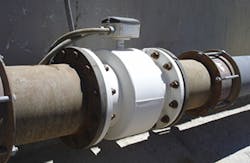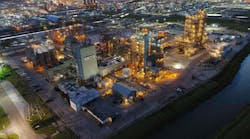Editor’s Note: This is Part V in a five-part series discussing the types of technologies that can be applied to measure the flow of raw materials.
READ ALSO: Part I—Considering the Pros & Cons of Volumetric Flow Measurement
READ ALSO: Part II—The Pros & Cons of Velocity Meters for Volumetric Flow Measurement
READ ALSO: Part III—The Pros & Cons of Mass Flowmeters for Volumetric Flow Measurement
READ ALSO: Part IV: How Differential Pressure Flowmeters Are Used for Volumetric Flow Measurement
Positive-displacement flowmeters that measure the actual volume of the fluid passing through the flowmeter (volumetric flow), flowmeters that measure fluid velocity, flowmeters that measure mass flow, and differential-pressure flowmeters that measure inferentially were discussed in previous articles. These technologies measure volumetric flow, infer volumetric flow, measure mass flow, and measure velocity head (respectively).
This conversation started with, "There are many technologies that can be applied to measure the flow of raw materials such as positive displacement, turbine, vortex shedding, differential pressure, and Coriolis mass flowmeters. Which technology would you select assuming that all of these technologies will operate reliably in the service?"
Raw materials react with each other on a mass basis so it would be advantageous to measure their mass flow—not measure their volumetric flow, velocity or velocity head. However, raw materials typically represent the largest single cost associated with production. Therefore accurate flow measurement is desirable to ensure that the correct amounts of raw materials are fed to the process so as to reduce waste.
All of the cited flowmeters are used to reliably measure the flow of raw materials. However, Coriolis mass flowmeters not only directly measure mass flow (the desired process variable), but they can also measure mass flow accurately in many liquid applications and in some gas applications. On the other hand, Coriolis mass flowmeters are often significantly more expensive than the other flowmeters.
Other process constraints, such as size, physical properties, chemical properties, and process conditions may dictate the use of other flow measurement technologies. Feeding the correct amount of raw materials to the process is not only more economical, it also can reduce waste and reduce the impact of the process on the environment. As with many things in life, there are tradeoffs when it comes to flow measurement, and you must decide which application characteristics are most important to your success and let that information lead you to the appropriate technology solution.
David W. Spitzer is a regular contributor to Flow Control magazine and a principal in Spitzer and Boyes, LLC, offering engineering, training, strategic marketing consulting, distribution consulting, and expert witness services for manufacturing and automation companies. Spitzer and Boyes is also the publisher of the Industrial Automation INSIDER. Mr. Spitzer has more than 40 years of experience and has written more than 10 books and 300 articles about flow measurement, instrumentation and process control. David can be reached at 845-623-1830 or via spitzerandboyes.com. Click on the "Products" tab to find his Consumer Guides to various flow and level measurement technologies.


